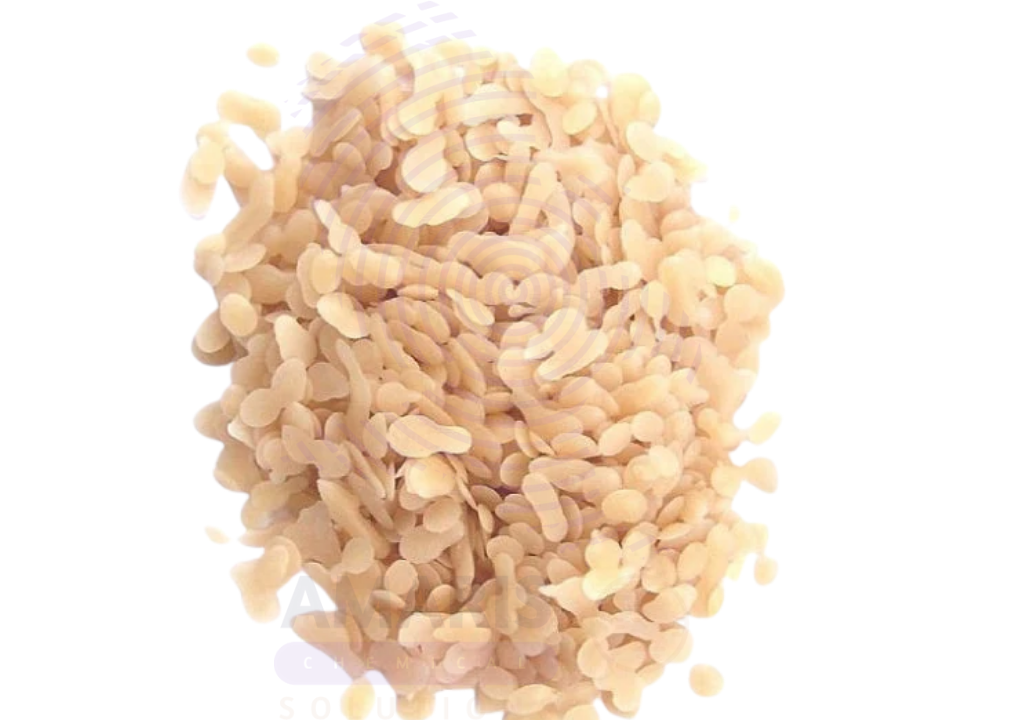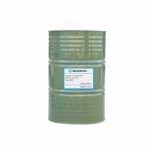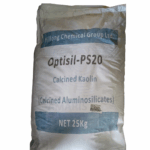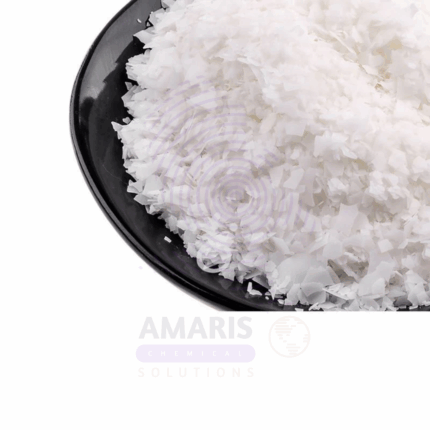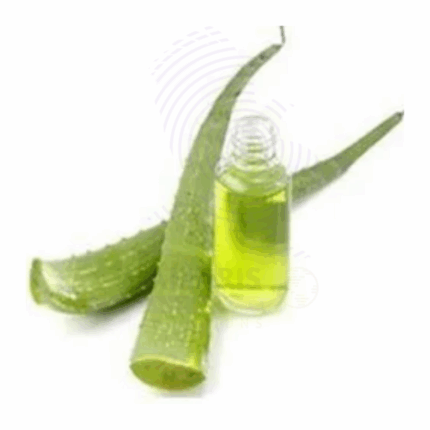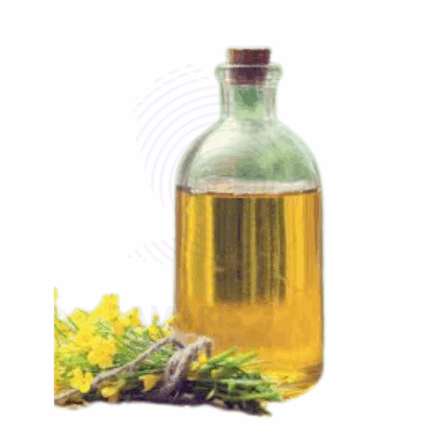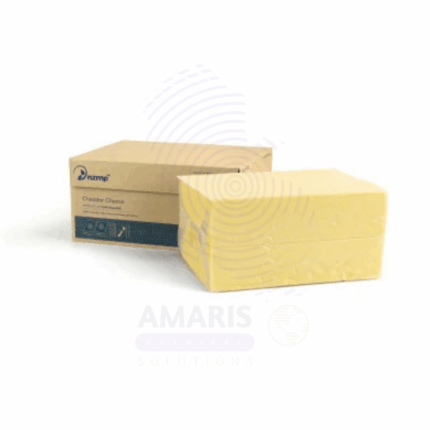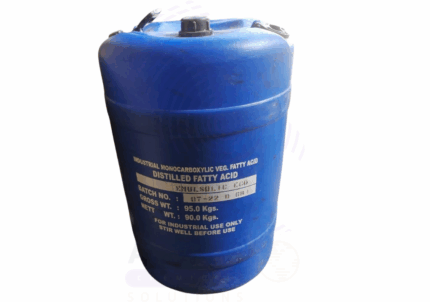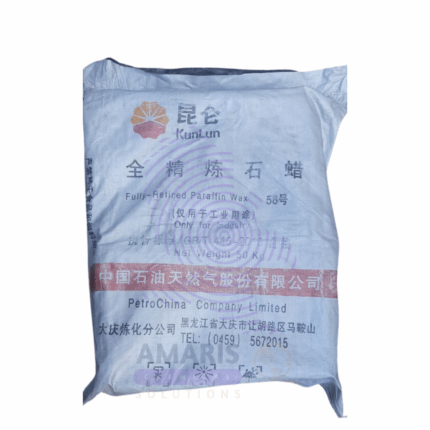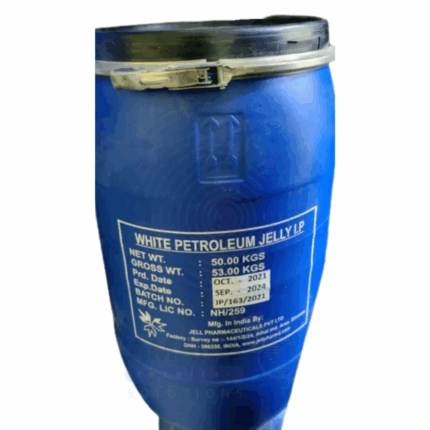Jojoba Wax
Whatsapp Order
Jojoba Wax is a natural, golden-yellow to amber-colored wax ester extracted from the seeds of the jojoba plant (Simmondsia chinensis). Unlike traditional vegetable oils, jojoba wax is chemically a liquid wax, known for its excellent stability, moisturizing properties, and similarity to human sebum. It is odorless or mildly nutty and is widely used in cosmetics, personal care, and pharmaceutical applications as an emollient, thickener, and skin conditioning agent.
Category: Emollients
Tags: Cosmetic ingredient, Emollient, Hydrogenated Jojoba Oil, Jojoba Wax, Natural wax
Description
Table of Contents
Toggle
Jojoba Wax
Primary Uses
- Cosmetic and Personal Care Industry
- Used extensively as an emollient and moisturizer in creams, lotions, balms, lipsticks, sunscreens, and hair care products to provide long-lasting hydration and skin softness.
- Functions as a natural thickening agent and texture enhancer, improving the spreadability and stability of formulations.
- Serves as a protective barrier on the skin, preventing moisture loss without clogging pores.
- Utilized in hair conditioners and styling products to impart shine and smoothness.
- Pharmaceutical Industry
- Used as a skin conditioning agent in topical ointments and creams to soothe and protect damaged or sensitive skin.
- Acts as a carrier and stabilizer for active ingredients in transdermal and topical drug delivery systems.
- Industrial and Technical Applications
- Used as a biodegradable lubricant in machinery and precision instruments requiring a non-greasy, long-lasting lubricating film.
- Applied in polishes and coatings for wood, leather, and metals to enhance surface protection and sheen.
Secondary Uses
- Food Industry
- Occasionally used as a glazing agent or coating in food applications, subject to food-grade certification and regulatory approval.
- Hair Care Treatments
- Employed in scalp treatments and hair masks for conditioning and anti-frizz properties.
- Natural and Organic Products
- Popular ingredient in natural and organic formulations due to its biodegradability and plant-based origin.
- Crafts and DIY Uses
- Utilized in homemade balms, salves, candles, and other handcrafted personal care products as a natural wax base.
KEY PRODUCT FEATURES
1. Basic Identification Attributes
- Chemical Name (IUPAC): Mixture of long-chain wax esters predominantly eicosenoates and docosenoates
- Common/Trade Name: Jojoba Wax; Jojoba Oil Wax
- CAS Number: 61789-91-1 (for jojoba oil; wax form similar)
- HS Code: 1515.90.00
- Synonyms: Jojoba oil wax; Liquid wax from jojoba seeds
2. Physical & Chemical Properties
- Physical State: Liquid wax (semi-solid at room temperature, depending on purity)
- Color & Odor: Golden yellow to amber; mild, nutty or odorless
- Melting Point: Approx. 6–10 °C (varies)
- Density: Approx. 0.86–0.87 g/cm³
- Solubility: Insoluble in water; soluble in organic solvents such as ethanol, hexane
- Stability: Highly stable to oxidation and heat
3. Safety & Hazard Attributes
GHS Classification:
- Generally regarded as safe and non-hazardous
- May cause mild skin or eye irritation in sensitive individuals
Toxicity:
- Non-toxic and biocompatible with skin
Exposure Limits:
- Not applicable
4. Storage & Handling Attributes
Storage Conditions:
- Store in a cool, dry place away from direct sunlight and heat sources
Container Type:
- Typically stored in sealed food-grade plastic or glass containers
Shelf Life:
- Stable for 1–2 years if stored properly
Handling Precautions:
- Avoid contamination and moisture ingress
- Use gloves when handling bulk material to maintain purity
5. Regulatory & Compliance Attributes
- Approved for cosmetic and pharmaceutical use by FDA, EMA, and other regulatory bodies
- Complies with natural and organic certification standards where applicable
- Labeling must reflect botanical source and purity levels
6. Environmental & Health Impact
- Biodegradability: Fully biodegradable and environmentally friendly
- Ecotoxicity: Low environmental toxicity
- Bioaccumulation: Not expected to bioaccumulate
- Carcinogenicity/Mutagenicity: Not classified as carcinogenic
SAFETY HANDLING PRECAUTIONS
Safety Handling Precautions
PPE Required:
- Gloves recommended for bulk handling
Handling Guidelines:
- Avoid contamination; maintain hygienic conditions
Storage Measures:
- Keep container tightly sealed and protected from excessive heat
First Aid Measures
- Inhalation: Not typically hazardous; move to fresh air if irritation occurs
- Skin Contact: Wash with soap and water if irritation occurs (rare)
- Eye Contact: Rinse with water if irritation develops
- Ingestion: Non-toxic; seek medical attention if large quantities swallowed
Firefighting Measures
- Fire Hazards: Combustible organic material; will burn with smoke and fumes
- Extinguishing Media: Use foam, dry chemical, or CO₂ extinguishers
- Special Precautions: Wear full protective equipment and self-contained breathing apparatus if involved in fire
- Hazardous Combustion Products: Carbon monoxide, carbon dioxide, and organic vapors
Related products
Almond Wax
Almond Wax is a natural, plant-based wax derived from the hydrogenation of almond oil (Prunus amygdalus dulcis). It is a creamy to white, semi-solid wax with a mild, nutty scent and excellent emollient properties. Almond Wax is rich in fatty acids and has a smooth, soft texture, making it ideal for use in cosmetic, personal care, and candle formulations.
Due to its gentle consistency, skin-friendly profile, and moisturizing capabilities, Almond Wax is widely used in body butters, balms, lip care products, massage bars, and artisan soaps. It functions as a natural alternative to petroleum-based waxes and provides structure, viscosity, and glide to formulations. It also finds application in soft wax blends for natural candle products.
Aloe Vera Oil
Aloe Vera Oil is an oil-based extract derived by infusing Aloe vera (Aloe barbadensis) leaves into a carrier oil such as coconut, soybean, or sunflower oil. It captures the beneficial compounds of aloe—including polysaccharides, vitamins, enzymes, and amino acids—in an oil-soluble form ideal for cosmetic, therapeutic, and personal care applications. Known for its soothing, anti-inflammatory, and moisturizing properties, Aloe Vera Oil is widely used in skin and hair care formulations.
This gentle, skin-friendly oil is suitable for sensitive skin and is commonly employed in after-sun products, healing ointments, massage oils, and anti-aging creams. It provides hydration, calms irritation, and promotes skin regeneration while adding emollient and conditioning benefits.
Canola Oil
Canola Oil is a light, non-greasy vegetable oil extracted from the seeds of the Canola plant (Brassica napus, Brassica rapa), a cultivar of rapeseed developed for its low erucic acid content. Rich in monounsaturated fats, omega-3 and omega-6 fatty acids, and vitamin E, it is known for its heart-healthy profile and neutral flavor.
Widely used in the food, cosmetic, pharmaceutical, and industrial sectors, Canola Oil serves as a versatile base oil for cooking, skincare formulations, softgel encapsulation, and biodiesel production. Its high smoke point and oxidative stability make it ideal for both cold and high-temperature applications.
Coffee Butter
Coffee Butter is a natural, plant-derived fat extracted primarily from the coffee seed pulp or coffee cherry, sometimes from the coffee bean itself. It is a creamy, pale yellow to light brown solid at room temperature with a mild coffee aroma. Coffee Butter is rich in fatty acids, antioxidants, and vitamins, making it a valuable ingredient in cosmetics, skincare, and specialty food products. Known for its emollient, moisturizing, and antioxidant properties, Coffee Butter helps to nourish and protect the skin while providing a pleasant sensory experience. It is gaining popularity as a sustainable by-product of coffee processing, contributing to zero-waste initiatives.
Dimethicone Silicon Oil
Dimethicone Silicon Oil, also known as polydimethylsiloxane (PDMS) or silicone oil, is a clear, odorless, and non-volatile silicone-based polymer widely used for its lubricating, anti-foaming, water-repellent, and skin-conditioning properties. It is a linear silicone polymer composed of repeating dimethylsiloxane units. Dimethicone exhibits excellent thermal stability, chemical inertness, and low surface tension, making it highly versatile in pharmaceutical, cosmetic, personal care, industrial, and food applications. It is available in various viscosities, from very low to high viscosity oils, enabling tailored formulations.
Fatty Acid
Fatty acids are a group of carboxylic acids consisting of long aliphatic chains, which can be either saturated or unsaturated. They are typically derived from natural fats and oils through hydrolysis or saponification and appear as colorless to pale yellow liquids or solids depending on the chain length and degree of saturation. Fatty acids are fundamental building blocks in biochemistry and industrial chemistry, serving as raw materials in the manufacture of soaps, detergents, lubricants, cosmetics, plastics, and food additives. Their amphiphilic nature—containing both hydrophilic (carboxyl group) and hydrophobic (alkyl chain) components—makes them versatile for various chemical and industrial applications.
Fully Refined Paraffin Wax
Fully Refined Paraffin Wax is a highly purified, odorless, white to pale yellow wax obtained from the refining of petroleum-derived crude paraffin wax. It consists primarily of saturated hydrocarbons (alkanes) with chain lengths typically between C20 and C40. Due to its excellent chemical stability, non-toxicity, and versatility, Fully Refined Paraffin Wax is widely used across numerous industries including cosmetics, pharmaceuticals, food packaging, candle making, rubber processing, and electrical insulation. It exhibits a high melting point, low volatility, and good water resistance.
Petroleum Jelly
Petroleum Jelly is a semi-solid mixture of hydrocarbons, originally derived from petroleum refining. It is odorless, colorless (or slightly yellow), and known for its moisturizing, protective, and lubricating properties. Widely used in cosmetics, pharmaceuticals, and industrial applications, Petroleum Jelly forms a barrier on the skin that locks in moisture and protects against irritants. The 175kg packaging is typical for bulk industrial or large-scale cosmetic use.


 Preservatives(food)
Preservatives(food) Flavor Enhancers
Flavor Enhancers Acidulants
Acidulants Sweeteners
Sweeteners Antioxidants
Antioxidants Colorants(food)
Colorants(food) Nutraceutical Ingredients (food)
Nutraceutical Ingredients (food) Nutrient Supplements
Nutrient Supplements Emulsifiers
Emulsifiers
 Collectors
Collectors Dust Suppressants
Dust Suppressants Explosives and Blasting Agents
Explosives and Blasting Agents Flocculants and Coagulants
Flocculants and Coagulants Frothers
Frothers Leaching Agents
Leaching Agents pH Modifiers
pH Modifiers Precious Metal Extraction Agents
Precious Metal Extraction Agents
 Antioxidants(plastic)
Antioxidants(plastic) Colorants (Pigments, Dyes)
Colorants (Pigments, Dyes) Fillers and Reinforcements
Fillers and Reinforcements Flame Retardants
Flame Retardants Monomers
Monomers Plasticizers
Plasticizers Polymerization Initiators
Polymerization Initiators Stabilizers (UV, Heat)
Stabilizers (UV, Heat)
 Antifoaming Agents
Antifoaming Agents Chelating Agents
Chelating Agents Coagulants and Flocculants
Coagulants and Flocculants Corrosion Inhibitors
Corrosion Inhibitors Disinfectants and Biocides
Disinfectants and Biocides Oxidizing Agents
Oxidizing Agents pH Adjusters
pH Adjusters Scale Inhibitors( water)
Scale Inhibitors( water)
 Antioxidants(cosmetic)
Antioxidants(cosmetic) Emollients
Emollients Fragrances and Essential Oils
Fragrances and Essential Oils Humectants
Humectants Preservatives
Preservatives Surfactants(cosmetic)
Surfactants(cosmetic) Thickeners
Thickeners UV Filters
UV Filters
 Fertilizers
Fertilizers Soil Conditioners
Soil Conditioners Plant Growth Regulators
Plant Growth Regulators Animal Feed Additives
Animal Feed Additives Biostimulants
Biostimulants Pesticides (Herbicides, Insecticides, Fungicides)
Pesticides (Herbicides, Insecticides, Fungicides)
 Active Pharmaceutical Ingredients (APIs)
Active Pharmaceutical Ingredients (APIs) Excipients
Excipients Solvents(pharmaceutical)
Solvents(pharmaceutical) Antibiotics
Antibiotics Antiseptics and Disinfectants
Antiseptics and Disinfectants Vaccine Adjuvants
Vaccine Adjuvants Nutraceutical Ingredients (pharmaceutical)
Nutraceutical Ingredients (pharmaceutical) Analgesics & Antipyretics
Analgesics & Antipyretics
 Analytical Reagents
Analytical Reagents Solvents(lab)
Solvents(lab) Chromatography Chemicals
Chromatography Chemicals Spectroscopy Reagents
Spectroscopy Reagents microbiology-and-cell-culture-reagents
microbiology-and-cell-culture-reagents Molecular Biology Reagents
Molecular Biology Reagents Biochemical Reagents
Biochemical Reagents Inorganic and Organic Standards
Inorganic and Organic Standards Laboratory Safety Chemicals
Laboratory Safety Chemicals Specialty Laboratory Chemicals(Special Laboratory Equipment)
Specialty Laboratory Chemicals(Special Laboratory Equipment)
 Demulsifiers
Demulsifiers Hydraulic Fracturing Fluids
Hydraulic Fracturing Fluids Scale Inhibitors(oil)
Scale Inhibitors(oil) Surfactants(oil)
Surfactants(oil) Drilling Fluids
Drilling Fluids
 Dyes and Pigments
Dyes and Pigments Bleaching Agents
Bleaching Agents Softening Agents
Softening Agents Finishing Agents
Finishing Agents Antistatic Agents
Antistatic Agents
 Admixtures
Admixtures Waterproofing Agents
Waterproofing Agents Sealants and Adhesives
Sealants and Adhesives Curing Compounds
Curing Compounds Concrete Repair Chemicals
Concrete Repair Chemicals Anti-Corrosion Coatings
Anti-Corrosion Coatings
 Surfactants(cleaning)
Surfactants(cleaning) Builders
Builders Enzymes
Enzymes Solvents (Cleaning)
Solvents (Cleaning) Fragrances
Fragrances
 Electronic Chemicals
Electronic Chemicals Catalysts
Catalysts Lubricants
Lubricants Photographic Chemicals
Photographic Chemicals Refrigerants
Refrigerants Automotive chemicals
Automotive chemicals Pyrotechnic Chemicals
Pyrotechnic Chemicals
 Biodegradable Surfactants
Biodegradable Surfactants Bio-based Solvents
Bio-based Solvents Renewable Polymers
Renewable Polymers Carbon Capture Chemicals
Carbon Capture Chemicals Wastewater Treatment Chemicals
Wastewater Treatment Chemicals
 Pigments
Pigments Solvents(paint)
Solvents(paint) Specialty Coatings
Specialty Coatings Binders/Resins
Binders/Resins Additives
Additives Driers
Driers Anti-Corrosion Agents
Anti-Corrosion Agents Functional Coatings
Functional Coatings Application-Specific Coatings
Application-Specific Coatings
 Leavening Agents
Leavening Agents Dough Conditioners
Dough Conditioners Flour Treatments
Flour Treatments Fat Replacers
Fat Replacers Decoratives
Decoratives Preservatives(baking)
Preservatives(baking)
 Plasticizers & Softeners
Plasticizers & Softeners Reinforcing Agents
Reinforcing Agents Adhesion Promoters
Adhesion Promoters Vulcanizing Agents
Vulcanizing Agents Antidegradants
Antidegradants Blowing Agents
Blowing Agents Fillers & Extenders
Fillers & Extenders Accelerators & Retarders
Accelerators & Retarders